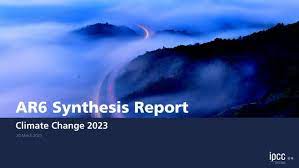Synthesis Report Of IPCC AR6:

The IPCC finalized the Synthesis Report for the Sixth Assessment Report during the Panel’s 58th Session held in Interlaken, Switzerland from 13 – 19 March 2023
- According to an IPCC report, climate change is a threat to human well-being and planetary health and a window of opportunity to secure a liveable and sustainable future for all is fast closing
Key Findings:
- Human-induced global warming of 1.1 degrees Celsius has spurred changes to the Earth’s climate that are unprecedented in recent human history.
- Already, with 1.1 degrees Celsius of global temperature rise, changes to the climate system that are unparalleled over centuries to millennia are now occurring in every region of the world, from rising sea levels to more extreme weather events to rapidly disappearing sea ice.
- Climate impacts on people and ecosystems are more widespread and severe than expected, and future risks will escalate rapidly with every fraction of a degree of warming.
- Adaptation measures can effectively build resilience, but more finance is needed to scale solutions.
- Climate policies in at least 170 countries now consider adaptation, but in many nations, these efforts have yet to progress from planning to implementation. Measures to build resilience are still largely small-scale, reactive and incremental, with most focusing on immediate impacts or near-term risks.
- Current global financial flows for adaptation are insufficient for, and constrain implementation of, adaptation options, especially in developing countries.
- There is a more than 50% chance that global temperature rise will reach or surpass 1.5 degrees Celsius between 2021 and 2040 across studied scenarios, and under a high-emissions pathway, specifically, the world may hit this threshold even sooner — between 2018 and 2037.
- India has many such examples of maladaptation, resulting in vulnerable communities becoming more helpless to the impacts of climate change rather than being able to adapt to them.
- Maladaptation is defined as the changes in natural or human systems that inadvertently increase vulnerability to climate stimuli.
- It is an adaptation measure that does not succeed in reducing vulnerability but increases it instead.
- Odisha has one of the most dynamic coasts in the country, with sea levels rising at a rate more than the average for the rest of the country.
- It is also the most cyclone-prone state in India.




